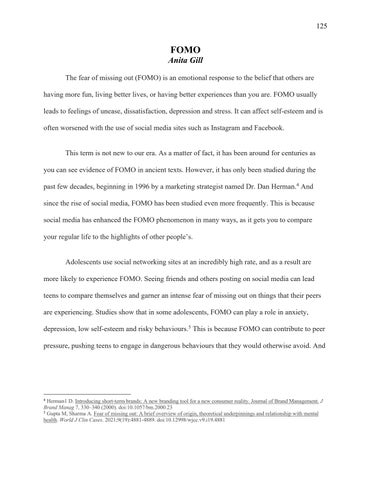125
FOMO Anita Gill The fear of missing out (FOMO) is an emotional response to the belief that others are having more fun, living better lives, or having better experiences than you are. FOMO usually leads to feelings of unease, dissatisfaction, depression and stress. It can affect self-esteem and is often worsened with the use of social media sites such as Instagram and Facebook. This term is not new to our era. As a matter of fact, it has been around for centuries as you can see evidence of FOMO in ancient texts. However, it has only been studied during the past few decades, beginning in 1996 by a marketing strategist named Dr. Dan Herman.4 And since the rise of social media, FOMO has been studied even more frequently. This is because social media has enhanced the FOMO phenomenon in many ways, as it gets you to compare your regular life to the highlights of other people’s. Adolescents use social networking sites at an incredibly high rate, and as a result are more likely to experience FOMO. Seeing friends and others posting on social media can lead teens to compare themselves and garner an intense fear of missing out on things that their peers are experiencing. Studies show that in some adolescents, FOMO can play a role in anxiety, depression, low self-esteem and risky behaviours.5 This is because FOMO can contribute to peer pressure, pushing teens to engage in dangerous behaviours that they would otherwise avoid. And
4 Herman1 D. Introducing short-term brands: A new branding tool for a new consumer reality. Journal of Brand Management. J Brand Manag 7, 330–340 (2000). doi:10.1057/bm.2000.23 5 Gupta M, Sharma A. Fear of missing out: A brief overview of origin, theoretical underpinnings and relationship with mental health. World J Clin Cases. 2021;9(19):4881-4889. doi:10.12998/wjcc.v9.i19.4881




































